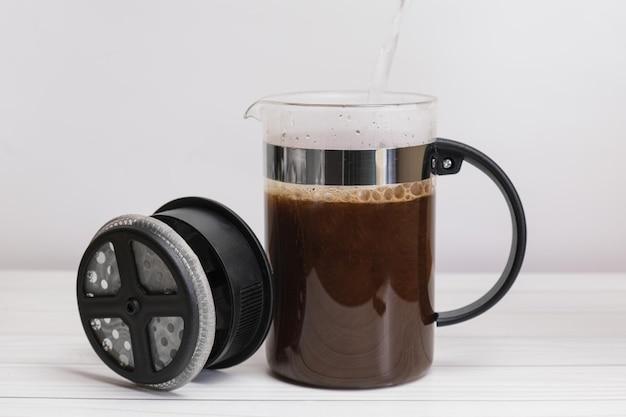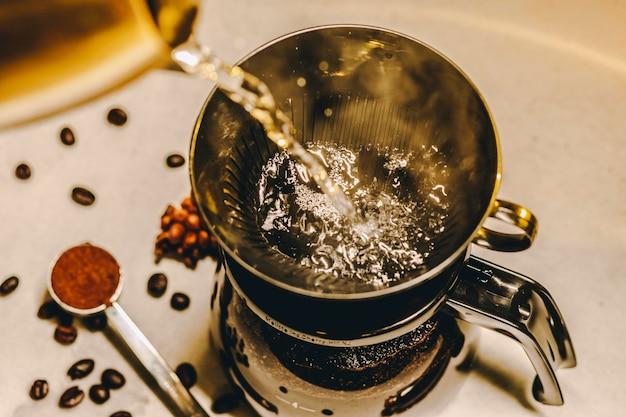Welcome to our blog where we delve into the interesting topic of glass and its delicate relationship with heat. Have you ever wondered if pouring boiling water into a glass container could result in a shattering catastrophe? Or perhaps you’ve had a glass door unexpectedly shatter before your eyes, leaving you perplexed? Glass is a fascinating material that can withstand various temperatures, but there are limits to its resilience.
In this blog post, we’ll explore the effects of intense heat on glass and answer burning questions like, “Will tempered glass break from heat?” and “How hot can glass get before it breaks?” So, if you’re eager to uncover the secrets behind glass and heat, read on to satiate your curiosity!
Can Glass Break From Boiling Water
The Science Behind the Shatter: Understanding Glass’s Hot Temper
When it comes to kitchen mishaps, few things evoke the same level of panic as a boiling glass kettle or pot suddenly shattering into a thousand tiny pieces. The question then arises: can glass truly break from something as harmless as boiling water? Let’s dive into the science behind this hot topic and separate fact from fiction.
The Myth of the Super Breakable Glass
Contrary to popular belief, glass is not inherently fragile and prone to spontaneous shattering when exposed to boiling water. In fact, glass has been used for centuries to withstand high temperatures in various applications, from laboratory beakers to oven-safe cookware. So why does it sometimes crack or break?
Thermal Shock: The Culprit Behind Glass Breakage
The answer lies in a phenomenon called thermal shock. Glass, being a poor conductor of heat, struggles to distribute the sudden temperature change caused by boiling water efficiently. When hot liquid is poured into a cold or room temperature glass vessel, the inside of the glass expands rapidly while the outer surface remains relatively unchanged. This drastic difference in thermal expansion creates stresses within the glass, which can lead to cracks or fractures.
Quality Matters: Choose Your Glass Wisely
While glass can withstand high temperatures, not all glasses are created equal. Certain types of glass, such as borosilicate glass, are specifically designed to withstand thermal shock better than others. Borosilicate glass, commonly used in laboratory glassware, is made with a higher percentage of boron trioxide, giving it superior thermal resistance. This type of glass is less likely to succumb to the rapid temperature changes caused by boiling water, reducing the risk of shattering.
Safety First: Tips to Prevent Glass Breakage
To minimize the chances of your glassware breaking when exposed to boiling water, here are a few handy tips:
-
Heat it up gradually: Preheating your glassware by running warm tap water over it before pouring in boiling water can help reduce the temperature difference and prevent thermal shock.
-
Avoid extreme temperature changes: Never place a cold glass dish directly on a stovetop burner or transfer it from the freezer to a hot oven. Gradual temperature changes are key to preserving the integrity of your glassware.
-
Opt for heat-resistant glassware: When purchasing glassware, opt for those specifically labeled as heat-resistant or borosilicate glass. Investing in quality materials can save you from a kitchen catastrophe.
While the idea of glass shattering from boiling water may seem like a common occurrence, it is not entirely accurate. Glass is a dependable material that, with proper care and understanding, can withstand the heat of boiling water without issue. By considering the type of glassware you use and following some simple precautions, you can enjoy your tea, coffee, or favorite soup without the fear of a sudden glass explosion. Stay safe and savor your piping hot beverages!
FAQ: Can Glass Break From Boiling Water
Welcome to our FAQ section where we will tackle some of the most burning questions related to the hot topic of glass and boiling water. So, put on your reading glasses and let’s dive right in!
Will tempered glass break from heat
Tempered glass is a tough cookie! It undergoes a special heating and cooling process that strengthens it. While it can handle a fair amount of heat, extreme temperature changes might send it crackling. So, it’s best to avoid subjecting tempered glass to boiling water directly.
What happens when a piece of glass is exposed to intense heat
Glass has a love-hate relationship with heat. When exposed to intense heat, glass expands. But when it cools down in a hurry or comes into contact with cold water while still piping hot, it can’t handle the shock, resulting in cracks or shattering. Talk about a hot mess!
How hot can glass get before it breaks
Glass has a breaking point, just like relationships do. On average, regular glass can’t handle temperatures beyond 150 to 200 degrees Celsius (or 302 to 392 degrees Fahrenheit). It’s best not to push it beyond its limits, unless you want to turn the heat up on disaster.
How hot is glass when it turns red
Ever wondered at what temperature glass gets cooking? Well, when it starts getting red-hot, we’re talking about a scorching 600 to 800 degrees Celsius (or a sizzling 1112 to 1472 degrees Fahrenheit). That’s when you know it’s time to back off and let it cool down before things get too heated.
Do mason jars break easily when dropped
Ah, the legendary mason jars. They might seem sturdy, but they have their limits too. While they are designed to resist higher temperatures than regular glass, they are not invincible. So, handle them with care, and avoid giving them a gravity lesson by dropping them from great heights.
Can a glass door shatter by itself
Glass doors aren’t huge fans of solo performances. While it might seem like some kind of spooky magic, there’s usually a logical explanation for a shattering glass door. It could be caused by temperature fluctuations, uneven stress, or even a hidden chip or crack. So, don’t blame the ghost next time!
Does glass break easier when hot
Glass can get a little touchy when it’s hot under the collar. When exposed to high temperatures, it becomes more susceptible to breakage. So, it’s kind of like dealing with someone who’s hangry – handle with care and avoid any sudden temperature changes to keep the peace.
How hot is too hot for glass
Just like Goldilocks and her porridge, glass prefers things not too hot and not too cold. To stay on the safe side, it’s best not to subject glass to temperatures beyond 150 to 200 degrees Celsius (or 302 to 392 degrees Fahrenheit). Remember, moderation is key, even when it comes to temperature.
Can you pour hot wax into glass
Looking to dip your toes into the mesmerizing world of candle making? Go ahead and pour that hot wax into a glass container! Glass can handle the heat from melted wax without breaking a sweat. Just make sure the glass is heat-resistant and free from any cracks or imperfections.
Can glass break with hot water
Glass is like a resilient supermodel – it can handle quite a bit. Pouring hot water into a glass won’t usually cause it to shatter, unless there are existing flaws or extreme temperature changes. Play it safe, and you’ll be sipping your hot beverages in glassy bliss.
Will a glass jar burn in a fire
Glass jars might be pretty to look at, but they’re not fire-friendly. When exposed to extreme heat, like a roaring fire, the glass can crack or shatter due to the sudden changes in temperature. So, resist the temptation to roast marshmallows over an open flame using your favorite glass jar.
Why did my glass cup explode
Well, it’s not personal, but it is physics. Glass cups can explode if they are subjected to high temperatures, have pre-existing flaws, or have experienced sudden temperature changes – yes, glass feels the burn too! So, let’s avoid turning your morning coffee into a domestic explosion. Safety first, always.
Can you pour boiling water into a Mason jar
Mason jars can handle a little heat! They’re often used for canning, preserving, and even for making lovely concoctions of infused water. Just make sure you’re using a heat-resistant Mason jar and avoid drastic temperature changes. Your jar will thank you by keeping your delicious drinks safe and sound.
Can I put a glass measuring cup on the stove
Oh no, the stove isn’t the right place for your glass measuring cup to catch up on its tanning. Glass is not stove-friendly and can’t handle direct heat from burners or flames. Stick to using your measuring cup for its intended purpose – measuring ingredients – and let the stove do its own cooking.
Can glass shatter for no reason
Sometimes, glass just wants to break free and do its own thing. Spontaneous glass breakage is rare, but it can happen due to invisible defects or microscopic cracks that suddenly decide to wreak havoc. So, don’t be too quick to blame the ghost in the room; there might be a logical explanation after all.
Can you pour boiling water into a glass measuring cup
Pouring boiling water into a glass measuring cup isn’t an automatic recipe for disaster. Just make sure you’re using a heat-resistant measuring cup, and avoid sudden temperature changes – hot glass plus cold water equals no good. With a little caution, your measuring cup will measure up to any hot challenge.
How can you tell if a glass jar is heat resistant
Feeling the heat and wondering if your glass jar can take it? Look for clues like the manufacturer’s label indicating heat resistance or any specific instructions for use with hot substances. Additionally, heat-resistant glass, such as borosilicate glass, is designed to endure high temperatures without cracking under pressure.
What type of glass can withstand high heat
When it comes to heat, some glass likes to show off its impressive endurance. Heat-resistant glass, like borosilicate glass, is built to handle high temperatures without succumbing to the heat wave. So, if you have some scorching experiments in the kitchen, seek out this heat-resistant hero.
Which type of glass is heat resistant
If you’re looking for the superhero of heat resistance, borosilicate glass is here to save the day! This type of glass can bear the brunt of high temperatures without breaking a sweat, making it ideal for various applications in laboratories, kitchens, and even outer space. Yes, even astronauts appreciate a heat-resistant superhero!
And there you have it, folks – an FAQ bonanza on the topic of glass and boiling water. We hope we’ve cleared up some of your burning questions and provided some helpful guidance when it comes to keeping your glassware intact. Stay cool, keep it glassy, and remember, don’t play with boiling hot water unless you’re ready to break some glassy boundaries!
Disclaimer: The information provided in this article is for informative purposes only. Always exercise caution and refer to specific product instructions or seek professional advice when dealing with glass and extreme temperatures.

